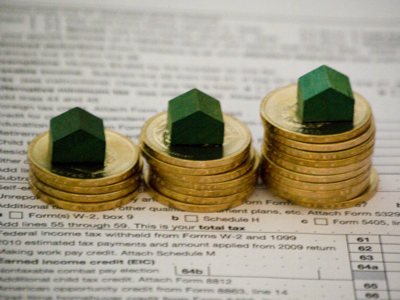
I would like to see your take on paying off a house faster (extra principal payments) so that overall your house hasn’t cost you all the extra interest; or investing your money, taxable or non-taxable. I’ve heard arguments on both sides, some for rental property some for personal property. I own a duplex, live in one half, rent out the other half. So I’m a little torn between arguments.
I feel like society has been brainwashed to not make extra payments, or if you do, only do a little extra.(IE…bi-weekly payments bring in your payoff date.) Mainly because the argument is “you get tax deductions!”
Owners of rental property claim: get a 30-year, make sure you have cash flow, don’t make any extra payments. The tax deductions offset your income.
Debt free “gurus” say: Why would you pay $10K in interest only to get a $2.5K deduction? The faster you pay it off, the faster you’re not paying an extra $10K each year while getting a measly deduction.
I could go on and on with all kinds of arguments. Thanks for your time,
Duplex owner
Great question! Financial advisors disagree because there are some things more important and some things less important. My advice is based on a millionaire mindset and not just a get-out-of-debt mindset.
In 2003 I wrote a column “Using A Mortgage Wisely” in which I listed seven rules for handling a mortgage. I started that column by saying, “Most Americans have a home mortgage. The rich often have two. Only the poor can’t take advantage of this ‘good’ debt.” Here are the seven rules:
1. Have a home mortgage
2. Borrow a 30-year fixed rate mortgage
3. Don’t buy down the interest rate by paying points
4. Keep your mortgage debt under 30% of your net worth and under 80% of the value of your home
5. Invest significantly in taxable investments each month
6. Diversify your investments between stable fixed investments and growth stock investments
7. After 8-11 years, pay off your mortgage or refinance depending on interest rates.
Having a mortgage at even as high as 6% means it is only costing you 4% and the government is paying the other 2% if you are in the 33% marginal tax bracket. Additionally, I don’t think you will ever see interest rates as low as they are right now. Just as the government will benefit from devaluing the buying power of the U.S. dollar because it will make it easier to pay off the national debt, so it will make it easier for you to pay off your mortgage with cheaper dollars over the next 30 years.
Bert Whitehead writes in “How to Get the Best Mortgage“, “A 30-year fixed rate mortgage is your best protection against inflation.” His article is worth reading and in it you will find much of the same advice.
Another way to look at a home mortgage which of the following is better:
(1) Having a home worth $360,000 which is appreciating with inflation
OR
(2) Having a home worth $360,000 appreciating with inflation PLUS a $300,000 fixed 30-year mortgage on which you are paying 3% interest and the government is paying 1% interest by lowering your taxes AND $300,000 in taxable investments earning an average of 9-10% over the next 30-years.
Clearly (2) is advantageous. Any time you wanted you could slap your investments over your mortgage and be debt free. In fact, if your investments appreciate by 10% they should double in about 7 years. That means in 7 years you could pay off your mortgage and still have $300,000 in investments left over.
One more advantage, if you ever do need the money, then if you have a mortgage you have a $300,000 cushion of an emergency fund. If you don’t have the mortgage and you get in financial trouble. NO ONE will loan you money once you are in financial trouble.
And this leads us to the reason for the mixed advice. If you are already living hand to mouth and unable to live within your means, you are not able to handle a mortgage well. If you can’t save money, then having $300,000 sitting around able to be spent will result in you spending it. Those with a millionaire mindset can have a mortgage. Those apt to spend and not saving should work at being debt free and learning to save.
Automate your savings, save 15% of your income consistently and decide to be rich.
Photo by Megan Marotta